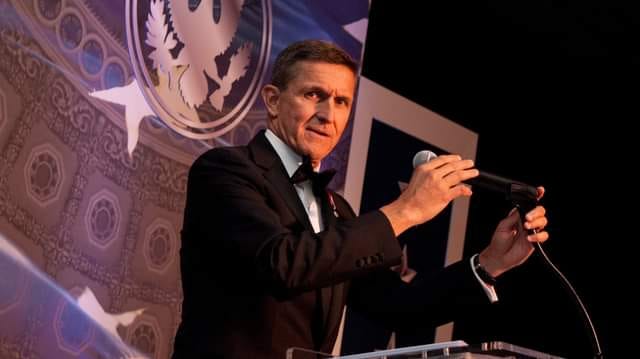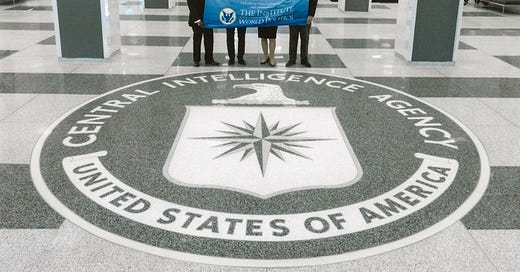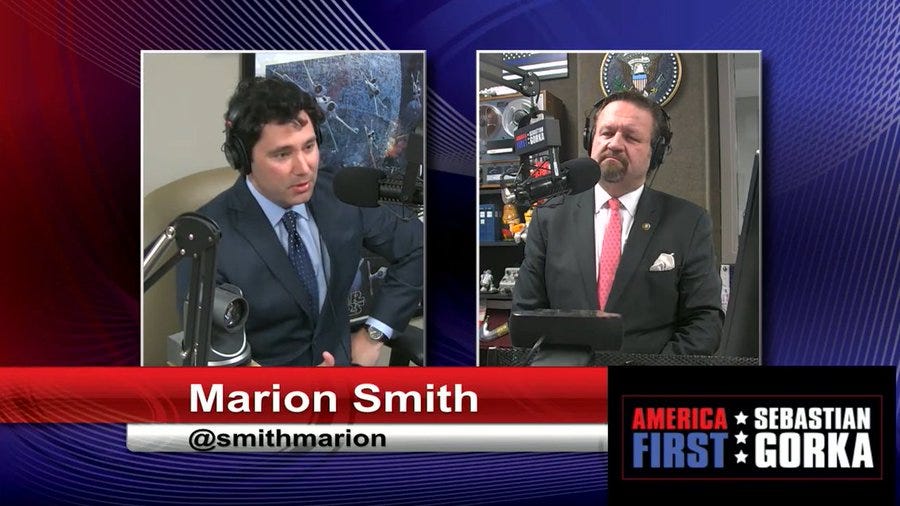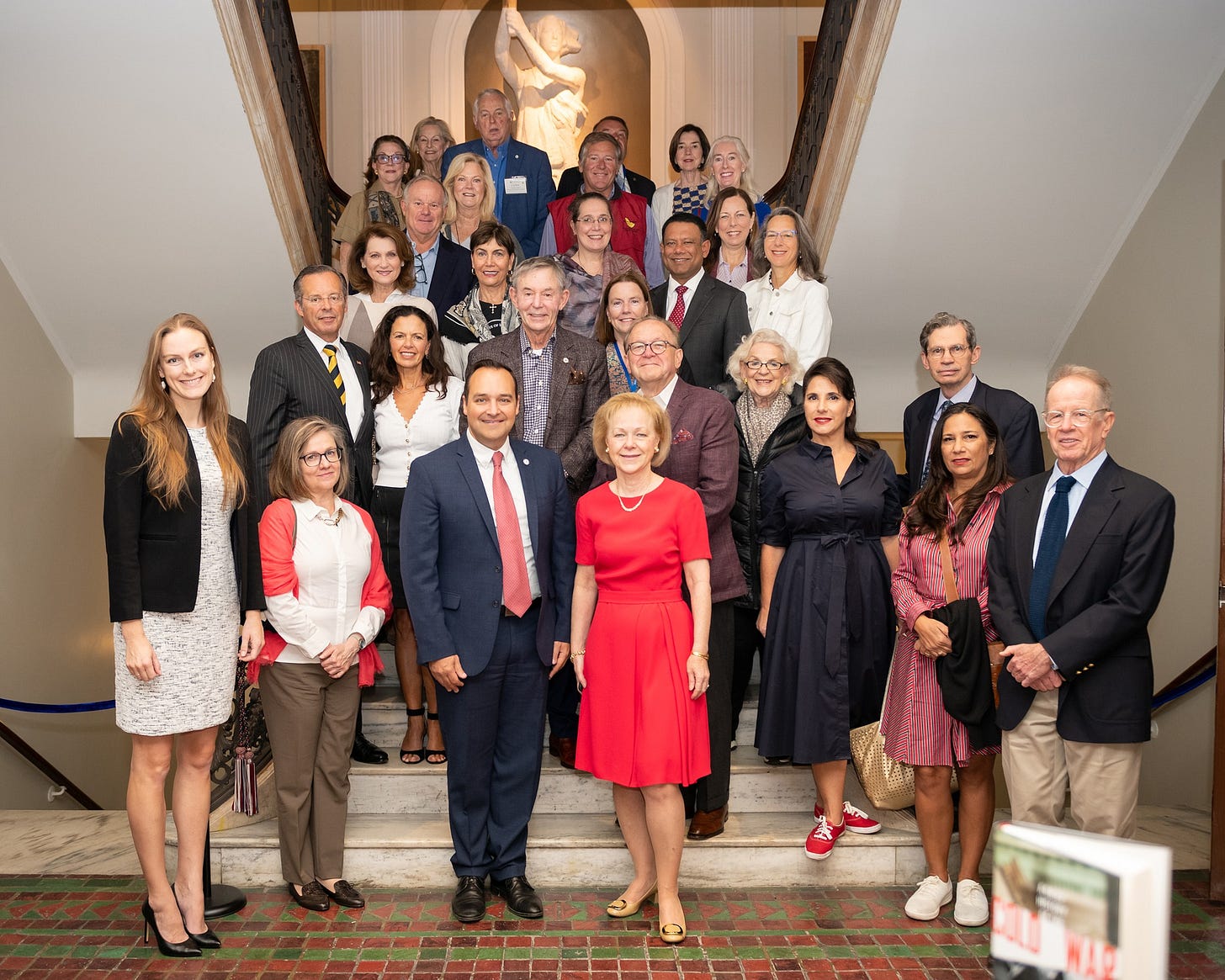PRELUDE: THE ORIGINAL ‘COLD WAR COLLEGE’
Once again we return to the Cold War-era “Fascist International,” or World Anti-Communist League (WACL, 1967-1990), which was famously “infiltrated” by “terrorists, Nazis, and Latin American death squads.” Both co-founders of the notorious Victims of Communism Memorial Foundation (VOC, est. 1994) were former leaders of the American Council for World Freedom, the first WACL affiliate in the United States (1970-75), which was closely tied to the American Security Council (ASC), an influential Cold Warrior think tank established in 1955 that eventually drifted into obscurity. According to WACL historian Keith Allen Dennis, the ASC leadership “formed the core of the American WACL contingent throughout the League’s history.”
"I'm delighted that we could have this get together today. I think you all of you know how important that I think the work of the American Security Council has been to the goals of this administration, and how valuable your work has been to me personally, both before I was in this job and since. But quietly and effectively, your COALITION FOR PEACE THROUGH STRENGTH has made a great contribution to restoring the credibility of America's defenses..." - Ronald Reagan at ASC reception in the White House, nine days after being re-elected President of the United States (1984)As told in a previous installment of this newsletter, VOC advisor John Singlaub (1921-2022) of Iran-Contra infamy served as the WACL president during Ronald Reagan’s second term in the White House. Singlaub, the chief of staff of US forces in South Korea under Jimmy Carter, was forced into retirement after speaking out against Carter’s planned troop withdrawal. The Washington Post reported (Jan. 6, 1979) that freshly fired Singlaub got “a public speaking job” at an “[ASC] complex once billed as the nation's only private Cold War college.” Singlaub, a fanatical Cold Warrior and founding member of the CIA, thus “joined a parade of hundreds of congressional aides, retired military officers and corporate executives who each year come to this tiny, bucolic hamlet to talk about the Pentagon, Moscow, and ultimately, World War III.”
For this is Boston, Va., home of the American Security Council, a place where the Cold War still rages. Boston, Mass., may claim to be the home of the American Revolution. But in this Boston, which comprises little more than a post office, several churches and an American Legion post, the Russian revolution is a constant topic…
Inside the estate is a complex once billed as the nation's only private Cold War college. It has seminar rooms, plush dormitories and offices from which a staff of 30, using computers, generates millions of mailings each year on behalf of the council and its tax-exempt arm, the American Security Council Education Foundation. Each mailing carries the same message: Moscow is winning the Cold War.
It is, of course, a controversial message and one that draws frequent criticism from Pentagon and administration officials. But it wins praise from the right. "They're very sharp activists," says William Rhatican, an associate of Richard A. Viguerie, the direct-mail wizard of conservative causes. "They're respectable both in terms of the New Right and Capitol Hill." Indeed, the council has put together a group of 140 congressmen called the Coalition for Peace through Strength… and the council's masthead is peppered with distinguished names and a gleaming list of polished brass.
"They're not kooks," says Wes McCune, who watches the right for the left through Group Research, a Capitol Hill-based operation. "They're the cold warriors. I just plain call them The Military-Industrial Complex."
Perhaps because of its prominent leadership, the council [ASC] recently has avoided the extreme right image of groups like the John Birch Society and the Liberty Lobby that are "still looking for a communist under every bed," according to council member Elbridge Durbrow, a U.S. ambassador to Vietnam from 1957 to 1961.
But the red-under-the-bed syndrome was not too far distant in the council's past. Originally founded in Chicago in 1955 as the Mid-American Research Library, the council's initial function was to compile files on suspected communists who might apply for jobs at large corporations. The first council members included Sears, Roebuck & Co., where [ASC founder John] Fisher worked until 1961, Motorola Inc., and Marshall Field & Co., but grew to include more than 1,500 employers.
In 1972, the council finally phased out its Chicago library, then believed to be America's largest private file on the political beliefs of individuals, and Fisher announced the council was shifting its focus to international security and nuclear strategy. But the personnel records, which ran to over 6 million file cards and which a 1960 council brochure called a "specialized subversive activities library," were moved to Boston, Va., where the council was trying to set up its Cold War college.
Newspaper investigations in the 1950s said that many of the files had been purchased from sources such as Harry Jung, a right wing publisher known during the 1930s for anti-Semitic and antilabor sentiments. Fisher told a reporter in 1961 that he had tried unsuccessfully to obtain the files of the late senator Joseph R. McCarthy, R-Wis., whose anti-communist tactics earned the censure of his Senate colleagues.
The personnel files are still here in Boston in the council's Sol Feinstone Library for the Survival of Freedom. Fisher says few requests for their use come in. A reporter who asked to wander in the stacks was allowed limited access only when escorted by the resident library director. The personnel files were not shown to the reporter…
The library of the American Security Council Foundation (est. 1958) eventually traveled 65 miles from the “Cold War Campus” in Boston, Virginia. The library now lives near Dupont Circle in Washington, D.C. at the Institute of World Politics (IWP), a distinctly right-wing private graduate school with close ties to the Central Intelligence Agency and the Victims of Communism Memorial Foundation. “The Institute’s library,” the IWP website proudly tells us,
currently contains more than 30,000 volumes, including thousands of rare and out-of-print national security books and documents from the American Security Council Foundation and from former senior government officials. In June 2002, the Institute received the gift of the extraordinary private library of William J. Casey, the late Director of Central Intelligence [1981-87].
VOC co-founder Lee Edwards, who organized the American Council for World Freedom, is a former adjunct professor at the Institute of World Politics, which was established in the same year that the World Anti-Communist League changed its name (1990). According to Edwards, “one truth is apparent: Communism does not crumble on its own.”
A ‘Far-Right’ CIA Feeder School

The Institute of World Politics, which is dedicated to “statecraft, national security, intelligence, and international affairs,” has received mixed online reviews from former employees and interns. “Great students, great mission, terrible leadership, awful ideology,” read the title of a one-star review from someone who said they did marketing and communications for IWP. “Pros: Good vacation time, great students. Cons: Virtually everything else.”
Extremely far-right-wing management and overall culture. If you're not in lockstep, best keep your mouth shut. Terrible pay, even for the nonprofit/academic world. Hidebound management that does everything the wrong way. IWP could be a great school if it wanted. Instead, it constantly flirts with being a right-wing think-tank, it coddles elderly has-been professors, and its management is stuck in the 80s.
“IWP is very conservative and hires people who are definitely like-minded,” said a former intern who left 4/5 stars. “I somehow missed this when I applied, but was able to adjust once I understood the atmosphere.” According to a former IWP intern on Reddit, “The interns tend to come from very wealthy families.”
A more satisfied former employee (4/5 stars, “Overall…Great place to work”) said the IWP is a small school with a “very family-like” culture. John Lenczowski, the “founder-President…makes a point of learning each students name.” The Pros: “Good people, flexible schedule, autonomy.” The Cons: “Not much diversity.”
Lenczowski, the director of European and Soviet Affairs on Ronald Reagan’s National Security Council, is a longtime member of the secretive and influential right-wing Council for National Policy. He chaired a breakout session (“International Institutions vs. National Independence”) at the 2019 National Conservatism conference in Washington, which also heard from an IWP adjunct professor. The IWP co-sponsored another “NatCon” event in London that year.
The Institute of World Politics is explicit about being a feeder school for the US intelligence community, and the CIA in particular. In 2016, the IWP released a promotional video starring two former CIA directors, James Woolsey and Michael Hayden. At that point, Woolsey was the IWP chancellor, and the school’s board of trustees proudly included William H. Webster, “the only person who ever held both the position of director of the FBI (1978-87) and CIA (1987-91).”
“Dear Current or Future Intelligence Officer, National Security Advisory, Foreign Service Officer or International Affairs Professional” reads a “Prospective Students” page on the Career Services section of the IWP website.
CIA recruiters occasionally hold information sessions and other events (restricted to U.S. citizens) at the IWP campus sponsored by the Office of Career Services. Derrick Dortch, the IWP Director of Career Services, is a veteran of the U.S. Marine Corps and the host of a radio show, “Fed Access.”
For almost thirty years, Dortch has led The Diversa Group, “a global management and strategic consulting firm” that provides “specialized services” such as helping people “win interviews and jobs or move up the career ladder at various [intelligence] agencies.”
Dortch was a friend of Brian Kelley, a famous former CIA counterintelligence officer who joined the IWP faculty and donated his personal library to the Institute. Kelley taught at both the IWP and CIA University. In 2012, Dortch interviewed John Guyant, the CIA University Chief Learning Officer, for “Fed Access.” Next month, Guyant, billed as a “senior executive” at the CIA, will be lecturing IWP students on “Exploring CIA Career Opportunities.”
Last year, the IWP highlighted one of its students, an intelligence collection manager for the U.S. Fleet Cyber Command. He chose IWP “after he was referred by General Michael Hayden, former Director of the CIA.” According to the student,
I really think that relationships are basically half the battle within D.C. itself. I spent a lot of time walking the corridors of the Pentagon, or going down to Langley [CIA headquarters] for different briefings, or visiting ODNI [the Office of Director of National Intelligence], the NCTC [National Counterterrorism Center], Bolling Air Force Base, and a lot of times, it was all about who you knew, or who referred you. IWP helps in that relationship building.
Earlier this year, a group of IWP students visited CIA headquarters. After a “recruitment briefing about the CIA’s new hiring process… the group was visited by a members of the IWP family who work in the building and wanted to say a special hello to the IWP group.”
According to the school’s website, “Students left even more committed to using their IWP education to one day join the ranks of the CIA.” They were accompanied by several IWP leaders, including the Dean of Academic Affairs, who is a former executive director of the American Security Council Foundation. They were also joined by IWP president Aldona Woś, an important trustee of the Victims of Communism Memorial Foundation.
The ‘Victims of Communism’ Campus
Last month’s “Winter Digest” noted that Tidal McCoy, “a profoundly Sinophobic venture capitalist,” recently joined the VOC board of trustees. “I call [China’s Belt and Road Initiative] the one belt around your neck and the one road to perdition initiative for the countries that are foolish enough to participate in it,” McCoy once said. What I did not mention is that McCoy, who claims to have been “part of the behind the scenes promotion of the idea of the United States Space Force,” is already a trustee of the Institute of World Politics.
“Bring him [Lenczowski, the IWP founder] out of the Cold War era,” an anonymous former employee (1/5 stars, “Disappointing”) said in 2014. “It is not good to use Cold War tactics on employees.” A self-described “Former Member of Senior Management” gave IWP two stars earlier that year. “No telling the truth to power without severe, career-jeopardizing repercussions…” According to another one-star review from 2014,
The top [IWP] leadership is completely unprofessional. Leadership is insecure and appears to feel threatened by experience and achievement among staff members. Board members seem to go along with poor performance, unfair removals and "purges" of staff, and lack of real planning combined with micro-management of insignificant matters by the top.
Three years later, an IWP intern gave the school 4/5 stars. “Cons: Little interaction with other organizations. Small intern pool. Advice to Management: More opportunity for interns to meet people from other organizations to network would be great.” Last summer, DC interns from the IWP, VOC, and (neocon) Foundation for Defense of Democracies got together at the new Victims of Communism Museum. But the IWP has been introducing its interns to the Victims of Communism for years.
A summer 2015 intern recalled, “IWP also offered a number of side activities. The first of these that I attended was the Victims of Communism wreath-laying ceremony.” The World League for Freedom and Democracy, the successor of the World Anti-Communist League, was listed alongside the Taipei Economic and Cultural Representative Office as among the participating organizations in that year’s VOC wreath-laying ceremony, or annual “Roll Call of Nations.” The IWP intern helped set up the event. Another time, he met Erik Prince, the founder of Blackwater and a former IWP trustee.
“Whether you’re talking with former ambassadors, CIA intelligence officers, or Mike Webber at the front desk, you’re sure to make some great memories,” raved a summer 2014 intern. Among other things, they attended a VOC reception to commemorate its 20th anniversary, visited the VOC memorial, and received a tour of the Holocaust Museum from Marek Jan Chodakiewicz, a nationalist Polish historian.
Subscribers may recall that George W. Bush appointed Chodakiewicz to the U.S. Holocaust Memorial Council, but he was removed following an exposé from the Southern Poverty Law Center. Chodakiewicz, a member of the VOC Academic Council, directs the IWP Center for Intermarium Studies. “The guy is an ideologist of the radical right,” once said Jan T. Gross, a prominent Polish historian of the Holocaust. “I don’t have any doubts that he’s anti-Semitic.”
According to an IWP intern from 2011, “A Polish professor took us to the Holocaust museum and preached right wing rhetoric.” Half a dozen years later, Chodakiewicz accompanied Donald Trump to Warsaw, and the Southern Poverty Law Center called him “Trump’s Right-Wing Handler for the Polish Visit.”
Before joining the Trump administration, far-right Hungarian-American commentator Sebastian Gorka was the “National Security and Foreign Affairs Editor” at the Breitbart News Network, and a vice president at the Institute of World Politics. He controversially worked in the White House as a senior advisor to Donald Trump for seven months while publications like The Forward dug further and further into Gorka.
After he finally left the White House, Sebastian Gorka returned to IWP as a “non-resident scholar.” The Heritage Foundation, which is even more closely tied to VOC (but more about that another day), hired Gorka as a consultant and/or to give “a series of five foreign policy speeches to Heritage audiences.” His wife also joined Heritage as a “research fellow for outreach” after working as a senior advisor in the Department of Homeland Security (2017-19).
The Gorkas attended the VOC’s “Centennial Commemoration Dinner” in November 2017, a month after the Heritage Foundation hired the controversial former Trump advisor. That day the VOC Twitter account retweeted Gorka. A year later, the Gorkas attended the VOC's “Triumph of Liberty Gala Dinner,” also at Union Station in DC.
In 2019, VOC executive director Marion Smith made at least three appearances on Sebastian Gorka’s podcast, “America First.” In those interviews, Gorka described the VOC as a “fabulous institution” and “incredible organization.” In February 2020, Gorka welcomed back Smith as a “good friend of the show,” and the VOC executive director praised Gorka's former boss: “President Trump has been the President more than any other that has confronted the Chinese Communist Party since they took power in China in 1949…” Later that year, Trump nominated Gorka to serve a four-year term on the board that “oversees the federal government’s national security education program.”
In 2021, the VOC and Heritage Foundation commemorated the 30th anniversary of the collapse of the Soviet Union. The first panel consisted of Sebastian Gorka, Lee Edwards, and a member of the VOC Academic Council who soon appeared on “The Gorka Reality Check,” a show on the right-wing channel Newsmax. Paul Kengor, who co-authored (with Edwards) the VOC’s anticommunist curriculum for middle and high school students, has been on “The Gorka Reality Check” at least three times.
“Is It Time for an Updated ‘Anti-Bolshevik Bloc of Nations?’” wondered IWP professor Paul Goble in 2016, referring to the coalition of former Nazi collaborators that represented the “subjugated nations” of the Soviet Union in the World Anti-Communist League. Goble, a former CIA analyst, is another member of the VOC Academic Council.
“Depressing how many people with senior government experience still read Paul Goble’s blog about the coming Russian race war / economic collapse,” once tweeted Max Seddon, the Moscow bureau chief at Financial Times. Maxim Edwards, a British journalist now with Bellingcat, has pondered, “has there ever been a social issue in Russia in which Goble doesn’t think will lead to its imminent collapse?”
Goble isn’t just a kooky analyst at the Jamestown Foundation, a conservative think tank founded under the auspices of CIA director William J. Casey. He has previously worked in the U.S. State Department and Washington’s propaganda apparatus (VOA, RFE/RL, etc). “Paul Goble Is for Real” reported Mirror-Spectator, the oldest Armenian-American newspaper, in 2020.
Indeed, a plan has been hatched in Turkey by some Azerbaijanis to liberate the current territory of the Republic of Armenia to establish there a new country and government called the Republic of Western Azerbaijan. The news may raise some eyebrows and cause disbelief, but if we analyze the political crosscurrents in the region and reveal the source of the news, it becomes deadly serious. The source of the news is Paul Goble, whose name is associated with an outrageous political plan which was floated first as a trial balloon, only to become eventually a major issue in a deal between Armenia and Azerbaijan.
Aldona Wos, the IWP president and VOC trustee, is married to Louis DeJoy, the U.S. Postmaster General since 2020. “They’re probably North Carolina’s ultimate power couple,” a former state GOP chairman once described them to the Greensboro News & Record. According to Open Secrets, as of August 2020,
Since the mid-1990s, DeJoy and his wife, Aldona Wos, have contributed over $3 million to federal Republican candidates. They donated two-thirds of that total since the start of the 2016 cycle, giving $1.2 million to a joint fundraising committee that distributed that money to President Donald Trump’s campaign and the Republican National Committee…
DeJoy and his wife, Aldona Wos, have hosted GOP fundraisers for decades. These include many in their Greensboro, N.C., home that, replete with a gold leaf-painted staircase, is known as “the castle.” Trump made his first presidential appearance at a fundraiser in DeJoy’s home in October 2017, months after DeJoy was named a deputy finance chairman of the Republican National Committee. In 2019, DeJoy was made the National Finance Chairman of the Republican National Committee, which at the time was to be held in Charlotte, N.C.
“The Election Could Be In Postmaster General Louis DeJoy’s Hands,” declared Buzzfeed News in November 2020. “To Understand How He Got There, Look To His Wife.” By that point, Trump had nominated Aldona Wos as the U.S. ambassador to Canada. Years ago, George W. Bush appointed her as ambassador to Estonia. Since then, Wos has served as the Secretary of Health and Human Services in North Carolina (2013-15), and the Vice Chair of Donald Trump’s Commission on White House Fellowships (2017-21). After 15 years on the IWP board of trustees, Aldona Wos became the interim president in 2022. The IWP website says that she “has rendered help to the school in so many ways.”
She has arranged speaking opportunities for our Founder and Chancellor, Dr. Lenczowski, and other Institute representatives, hosted lunches and dinners, sponsored the Institute’s most generous scholarship, introduced us to many supporters, introduced us to several universities that have become our partners, made many generous donations, and served as an active member of the Board’s Executive Committee.
Last year, three months after Aldona Wos became the president of IWP, she and her husband pledged $2 million to the Victims of Communism Museum, which is why one part of the museum says on the wall, “sponsored by the Louis Dejoy and Aldona Woś Family Foundation.”
Clearly, the Institute of World Politics has close ties to the Victims of Communism Memorial Foundation (in addition to the CIA). IWP founder John Lenczowski recently spoke at a VOC event dedicated to the 40th anniversary of Ronald Reagan’s “Evil Empire” speech. “IWP faculty and leadership have a longstanding relationship with VOC,” according to the Institute’s website.




